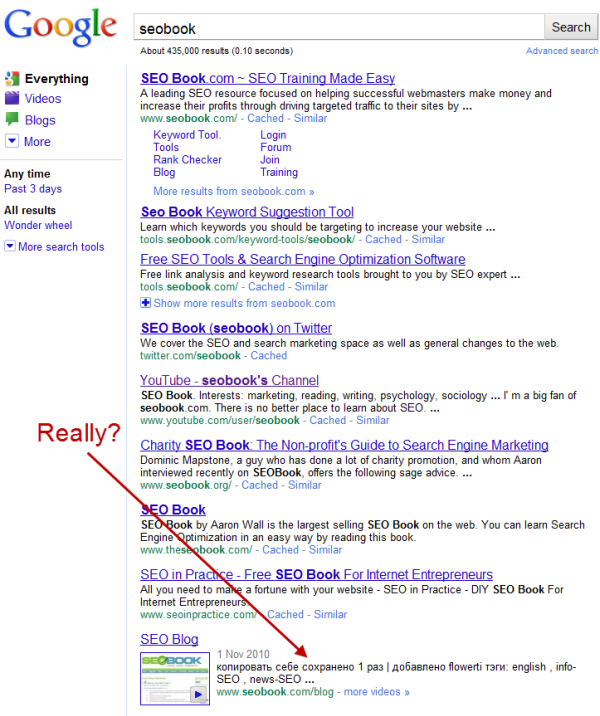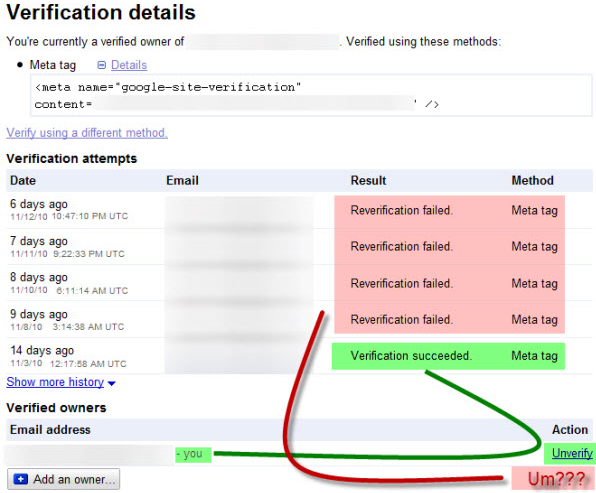Google: Complexity is Good!
Google is growing *far* more complex.
Page x can rank based primarily on the criteria for page y from that same site. So if you analyze the data behind the page which is showing up in the search results, in some cases you will be looking at the wrong data sets!
Google has typically displayed page titles in the search results. However there are now numerous exceptions to that.
Google has aggressively pushed into regionalization and localization, but sometimes they miscategorize a website's target market or a user's location ... delivering irrelevant search results.
Sometimes Google pulls data from 3rd party data sources and lists that next to your listing. I mean, sure they have used DMOZ historically, but why exactly are they showing my site as having Russian text on it?

As Google grows in complexity, the number of bugs in their system multiply. Sometimes you don't rank because you screwed up. But sometimes you don't rank because Google screwed up. Typically Google sees minimal difference either way, as there will always be another website to fill up the search results. But as a business owner, when Google gets it wrong you can be screwed pretty bad, particularly if you stock physical inventory and have to tightly manage your supply chain & cash flow.
Recently Google created a news source attribution tag. If it works, it might be a good idea. But (even outside of spam) there are ways it can backfire.
Consider Google's webmaster verification tags. One of our customers had an outing with an old webmaster who in turn did a sneaky change of location inside of Google Webmaster Tools over the weekend. After seeing traffic fall off a cliff, we figured out what happened & registered the site in Google webmaster tools. There are instructions on how to remove the former registered user, however the option does not appear in my client's account.

The redirect will allegedly be in place for 180 days! The only way to get around it is to ask for a review by the Google engineering team.
In the past SEO was primarily about encouraging (and, perhaps, in some nefarious angles, coercing) Google into giving you a little more love. But now a big part of SEO is identifying & fixing Google bugs. And this is before you consider things like universal search, custom vertical result sets, search personalization, social layers, traffic shaping, changing crawling priorities, sites getting hacked, filters hit by aggressive SEO or competitive sabotage, more random filters, changing related words in search vocabularies, using search query chains, Google Instant shifting keyword demand profiles, search engines competing against SEOs by monetizing the organic search results, basic/straightforward SEO concerns, technical crawling & indexing related issues, improper server configurations, new additional signals being added to search - like sentiment analysis. etc.
A big part of brand building in terms of SEO is not only to help you build up passive organic links (and to be able to charge a premium for your product), but it is also something which helps establish a bit of a competitive moat from algorithmic errors & makes it harder for Google to accidentally dump you. Further, if you have brand & catch a Google bug there is little risk to asking for a review. But if you do not have brand then even asking for a review could be risky.
Anyone who tells you that 'SEO is easy' across the board is either ignorant or exceptionally ignorant.




Comments
"Anyone who tells you that 'SEO is easy' across the board is either ignorant or exceptionally ignorant."
Do you know any people like that who work in online marketing? I'm thinking of a friend right now who quite obviously looks down on SEO a bit (and clearly doesnt know certain things about it), but considers online marketing in general a serious discipline.
Are other people in online marketing (not just hobby webmasters) similarly ignorant about SEO? your last phrase makes me wonder if you may have encountered one or two people like that :D
I wasn't referring to anyone specifically (and didn't have anyone in mind) when I wrote those words. But yeah a lot of people look down on fields they are ignorant about.
It is easier to dismiss one's own ignorance if one dismisses the field they are ignorant of at the same time.
I see..thx for the reply
I think we're seeing a new generation of seo client in response to this. Reasonable, smart people who know seo and see how Google is changing, and recognize that they need help with SEO strategy and execution beyond what has traditionally been known as seo.
Meta tags don't mean much any more. Links won't get you local rankings like they used to, and brandless/bland keyword content can't hold position under competitive stress like it used to (even on some exact match domains).
There will always be a game, even as the game changes. A whole lot of "seo" companies are in warm water right now, and it's getting hotter as their methods decline in value.
Historically our consulting clients that have been the best fit have been those which have already had some in-house resources. Going forward, that is likely only going to increase. However, as you stated, a lot of the people at the lowest tiers of the value chain are going to quickly wake up not being good enough for the market as things become more abstract / blurry / complex.
Add new comment